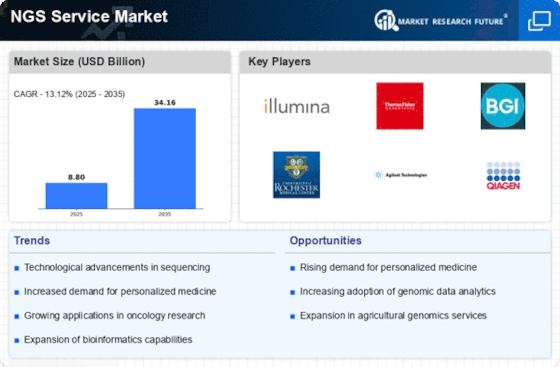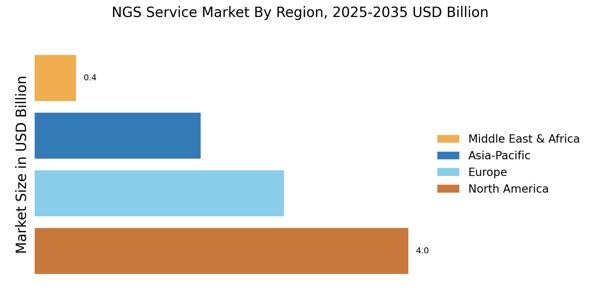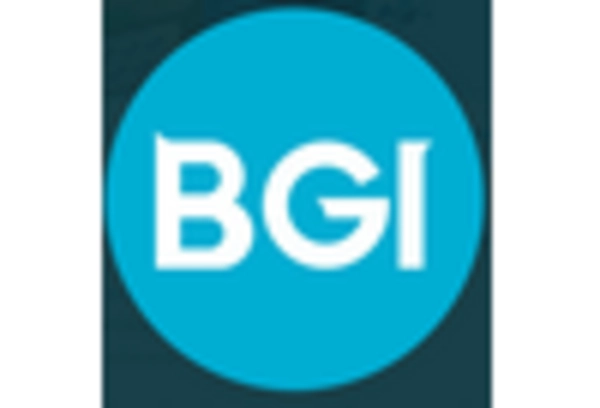Technological Advancements in NGS
The NGS Service Market is experiencing rapid technological advancements that are reshaping the landscape of genomic research and diagnostics. Innovations such as improved sequencing technologies, enhanced bioinformatics tools, and automation in laboratory processes are driving efficiency and accuracy. For instance, the introduction of third-generation sequencing technologies has significantly reduced the time and cost associated with genomic sequencing. As a result, the market is projected to grow at a compound annual growth rate (CAGR) of approximately 20% over the next five years. These advancements not only facilitate large-scale genomic studies but also enable researchers to explore complex genetic variations, thereby expanding the applications of NGS in clinical settings.
Collaborative Ecosystems in Genomics
The emergence of collaborative ecosystems within the NGS Service Market is fostering innovation and accelerating research. Partnerships among academic institutions, biotechnology firms, and healthcare organizations are becoming increasingly common, facilitating the sharing of resources and expertise. These collaborations often lead to the development of novel NGS applications and methodologies, enhancing the overall capabilities of genomic research. For example, joint initiatives in cancer genomics have resulted in significant breakthroughs in understanding tumor heterogeneity and treatment resistance. As these ecosystems expand, they are likely to drive the adoption of NGS technologies across various sectors, thereby contributing to market growth.
Increased Demand for Personalized Medicine
The rising demand for personalized medicine is a pivotal driver in the NGS Service Market. As healthcare shifts towards more individualized treatment approaches, the need for precise genomic information becomes paramount. NGS technologies provide comprehensive insights into genetic profiles, allowing for tailored therapies that enhance patient outcomes. According to recent estimates, the market for personalized medicine is expected to reach USD 2 trillion by 2030, with NGS playing a crucial role in this transformation. This trend is further fueled by the growing prevalence of genetic disorders and the increasing focus on preventive healthcare, which underscores the importance of genomic data in developing targeted treatment strategies.
Regulatory Support and Funding Initiatives
Regulatory support and funding initiatives are crucial drivers in the NGS Service Market. Governments and regulatory bodies are increasingly recognizing the potential of NGS technologies in advancing healthcare and research. Initiatives aimed at promoting genomic research, such as grants and subsidies, are being implemented to encourage innovation. For instance, funding programs for genomic studies have seen substantial increases, with some countries allocating millions to support NGS-related projects. This financial backing not only stimulates research but also enhances the accessibility of NGS services, thereby broadening their application in clinical diagnostics and personalized medicine.
Growing Applications in Clinical Diagnostics
The growing applications of NGS in clinical diagnostics represent a significant driver in the NGS Service Market. As healthcare providers seek more accurate and efficient diagnostic tools, NGS technologies are increasingly being integrated into routine clinical practice. Applications such as whole-genome sequencing, targeted gene panels, and liquid biopsies are gaining traction, enabling early detection of diseases and better management of patient care. The market for NGS in clinical diagnostics is projected to expand rapidly, with estimates suggesting a growth rate of over 25% in the coming years. This trend is indicative of the increasing reliance on genomic data to inform clinical decision-making and improve patient outcomes.

















